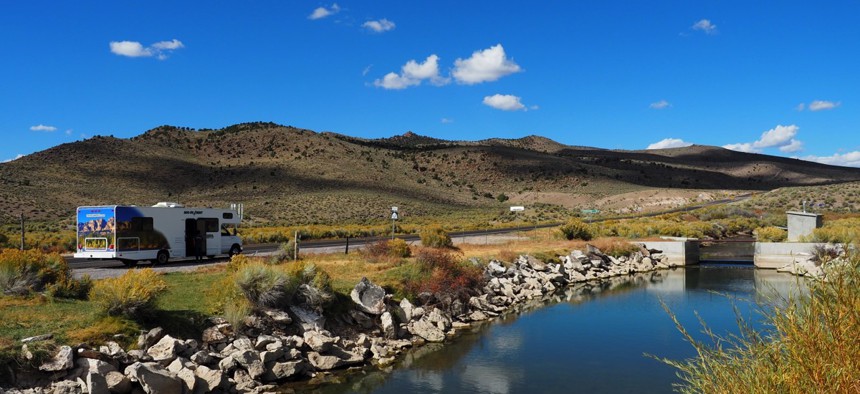Utah’s Cloud Flexibility Welcomes Innovative IoT and AI Solutions

When Utah upgraded its highway network in preparation for the 2002 Winter Olympics, the state also laid fiber.
In an interview with Route Fifty, state CIO Mike Hussey discusses rural broadband and lingering “last mile” challenges.
The Utah Department of Technology Services developed a cloud-hosted driver’s license practice exam app for the Amazon Echo that won Amazon Web Services’ City on a Cloud Innovation Challenge in July.
Alexa, the personal assistant device’s voice technology, walks users through test questions and statistics—the “skill” earning the state valuable, free Amazon cloud storage as a prize.
Aside from offsetting some of the cost of storage, the app represents Utah’s increasing fascination with the Internet of Things and even artificial intelligence as ways to provide services that include something as precise as informing residents of the best place to fish on any given day.
“We’re looking at developing some new apps and making them Amazon-esque, where it’s one-click [fishing or driver’s license] renewal using the Echo. I think other states are looking at that,” Utah CIO Mike Hussey told Route Fifty in an interview. “I was out at Amazon 6 to 8 months ago, and the talk was our app. I think everybody took from that, ‘Let’s expand our thinking on how we allow constituents to interface with the state.’”
To that end, it helps DTS has been centralized for more than a decade, granting Hussey the flexibility to change course when needed. Centralized data centers virtualize 90 percent of Utah’s information in a private cloud, the state shifting particular operations to the cloud only when it makes sense.
Utah was an early adopter of Google Apps for Government, allowing the state to get out in front of the cloud, as well as platforms as a service like Salesforce and ServiceNow.
Hussey’s team has blurred the line between private and public cloud offerings in a way that makes agencies more agile, as with the $600,000 cloud-based storage system Utah created for state police body camera footage.
Public cloud storage with Amazon mitigates broadband issues faced in usually rural parts of the state. Traditional storage in a state data center can lead to congestion because of the firewall protections around them.
“Because of our agreements with Amazon, that allows us to say, ‘Hey, it is safe, and we’ve already got a contract available, so let’s just go ahead and move it there.’”
Local internet service providers can share broadband connectivity with counties directly into the AWS cloud, avoiding “last mile” challenges where officers in rural jurisdictions take a long time to upload footage via a small circuit.
Utah is considering alternative broadband offerings to solve lingering last mile issues, and working on reducing the cost of transitioning off of older, serial interfaces to modern-day, ethernet interfaces.
The Utah Education Network boasts some of the best 10-gigabit connectivity in the state, Hussey said, so discussions on some kind of partnership are ongoing. DTS is also looking at using the Utah Department of Transportation’s extensive fiber network.
When Salt Lake City won the 2002 Winter Olympics bid, the state opted to upgrade its highway network and lay fiber in the process connecting Olympic venues.
“We were probably one of the most fiber-rich states at the time,” Hussey said.
UDOT paid for some of the fiber with grant funds, so DTS would need to ensure any use benefitted that agency as well.
Meanwhile FirstNet, the national communications network for first responders that’s under development, presents a wireless broadband option to any location, and Hussey has considered using wireless as a backup to some of Utah’s circuits.
“Broadband is becoming more of a utility; this is not something that is a luxury item,” Hussey said. “We’re always looking at opportunities. The only thing I want to know is, if the feds build a broadband network, I’d be cautious of them mandating that we jump onto it.”
Dave Nyczepir is a News Editor at Government Executive’s Route Fifty and is based in Washington, D.C.
NEXT STORY: States Are Moving to Protect Internet Privacy Now That the Feds Don't Care






